If you are looking for the best guitar scales books, you have come to the right place. In this blog post, we will discuss the different types of scales and which books are best for each level guitarist. Whether you are a beginner or an experienced player, there is a book out there that will help improve your skills!
Choosing the best book on guitar scales can help make the learning process more enjoyable and effective. The first thing to consider is your current skill level.
If you’re a beginner, it’s important to find a book that starts with the basics and gradually builds up to more complex material.
For intermediate or advanced players, look for books that offer new ideas and perspectives on scale patterns and fingering. It’s also important to consider the type of music you want to play.
If you’re mostly interested in rock or blues, there are books specifically designed for those genres. If you want to venture into jazz or classical territory, scale books with a more traditional approach may be more suited to your needs.
With so many different options available, taking the time to find the best book on guitar scales for your level and interests can make a world of difference in your playing.

Guitar scales are the foundation of everything you’ll play on the instrument. Without them, you’ll be severely limited in what you can do musically. Not only that, but learning scales will make you a better, more well-rounded player. Trust us – once you start learning and understanding them, they’re not nearly as daunting as they seem. In fact, they can even be fun!
So where do you start? That’s where this list comes in. We’ve handpicked some of the best books for learning guitar scales that prove scales don’t have to be boring and difficult.
Whether you want a book simply displaying all the scales in order or a thorough method book for learning to play scales and applying them to your solos, this list will help you choose the best book for your needs.
With a little bit of time and effort, you’ll be playing those pesky scales in no time – and who knows, you might even enjoy it!
The Guitarist’s Scale Book
If you’re looking for a comprehensive reference book on guitar scales and modes, look no further than The Guitarist’s Scale Book. This book includes more than 400 scales and modes, covering everything from major and minor scales to pentatonic scales and exotic cross-stringing scales.
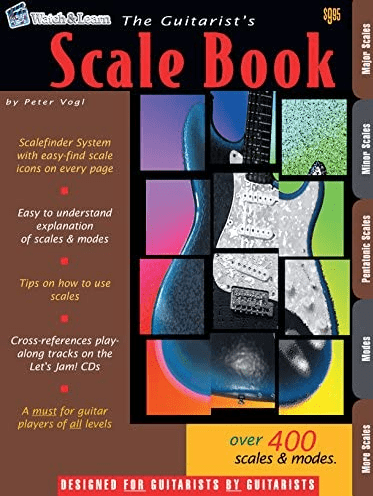
In addition to providing plenty of options for your scale practice, The Guitarist’s Scale Book also includes tips on how and when to incorporate these different scales into your playing. Whether you’re a beginner guitarist just starting to learn your scales or an experienced player looking to add some new sounds to your repertoire, this book is an essential resource.
The book is arranged in an easy-to-use format, with scales categorized by type and alphabetically. This makes it an ideal resource for both beginner and experienced guitarists alike. In addition, the book includes a wealth of information on music theory, making it an essential tool for those who want to improve their understanding of the instrument. Whether you are just starting out or are looking to expand your knowledge, The Guitarist’s Scale Book is an essential resource for any serious guitarist.
Guitar Chord, Scale & Arpeggio Finder
If you’re a guitar player, whether you’re a beginner or a seasoned pro, then you know how important it is to have a reference book that you can turn to when you need to brush up on your skills. And that’s exactly what the Guitar Chord, Scale & Arpeggio Finder is.
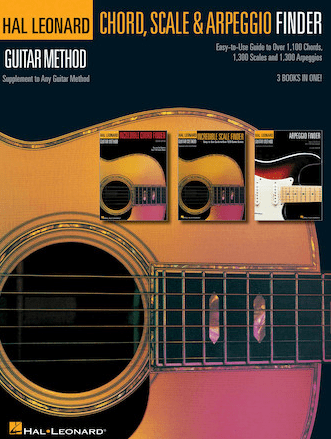
This book by Hal Leonard is perfect if you’re looking for a comprehensive reference book covering not only scales but also chords and arpeggios. The book is so well laid out that it’s incredibly easy to find what you’re looking for. The basic instructions on music theory also make the concepts clear, which is especially helpful for beginner guitarists. Overall, it’s a handy resource for any guitarist who wants quick, practical, and easy-to-understand references for scales, chords, or arpeggios.
The Guitar Grimoire
The Guitar Grimoire is an impressive reference book that covers a wide range of scales and modes. As any experienced guitar player knows, being able to improvise over chord progressions and understand the theory behind how music works is essential to becoming a versatile musician.
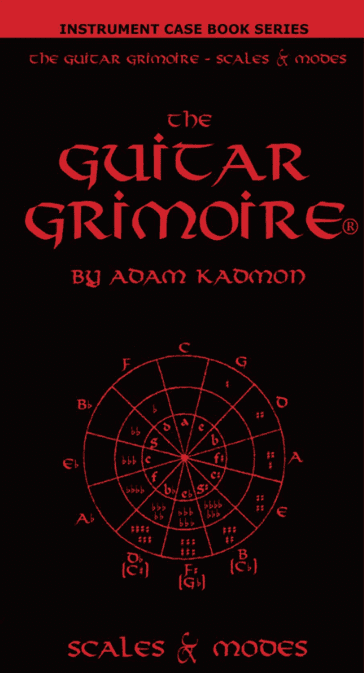
This massive tome provides detailed information on nearly every existing scale, including many exotic ones that are less well-known. One thing to keep in mind before purchasing this book is that it doesn’t include any practical exercises or guidance on how to play the scales.
However, for those who are already familiar with the basics of scale construction and guitar technique, The Guitar Grimoire is an invaluable resource.
If you want to enrich your guitar playing, The Guitar Grimoire is a fundamental resource book that you should have in your library.
It’s not meant to teach you how to play the scales, but it’s a comprehensive reference book that equips you with the knowledge of hundreds of scales and where to find them on your fretboard. Therefore, you can quickly open it and find any scale you want without needing another reference book.
However, if you’re self-teaching guitar, you’ll need an additional method book to get the most out of this book as it doesn’t include instructions on how to play the scales. Nonetheless, The Guitar Grimoire is an essential resource for any guitarist who wants to expand their repertoire and enhance their playing.
Guitar Scales Workshop
If you’re a guitarist who has been putting off learning scales, Guitar Scales Workshop is here to revolutionize the traditional methods and make the experience easy, logical, and fun. This all-in-one book is the combination of the three best-selling guitar scales books by the author, and it covers everything you need to know about scales in an easy-to-understand way.
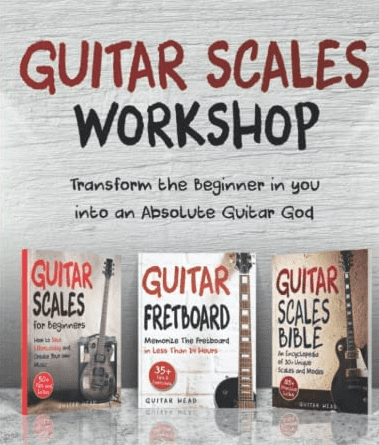
You’ll learn all the major and minor scales, plus a variety of other important scales, and you’ll be able to apply them to your playing immediately. The exercises and audio examples included in the book will help you learn quickly and efficiently, and you’ll be amazed at how much your playing will improve when you start using scales regularly. So don’t wait any longer, get Guitar Scales Workshop today and start learning scales the right way!
The first part of the book covers memorizing the fretboard, with the author providing a step-by-step method for quickly mastering the scale.
The second part features more than 30 different scales and lick ideas, all of which are clearly explained and easy to follow.
The third and final part offers a comprehensive reference guide to help you further develop your skills.
Whether you’re a beginner or a seasoned pro, the Guitar Scales Workshop is an essential tool for anyone looking to improve their guitar playing ability.
Guitar Scales In Context
One problem that guitarists often face is that they are taught scales in isolation, without being shown how those scales connect to other musical structures. This can be frustrating, because it is difficult to memorize all of the different scales and then figure out how and when to use them.

This book aims to eliminate that frustration by putting scales into context and showing the wider picture of musical structures. As you progress through the book, you will start to understand scales better, and the audio tracks will help you to incorporate them into your playing effortlessly. By the end, you will be able to use scales confidently in any situation, knowing exactly how and why they work.
If you’re a guitar player who’s looking to take your playing to the next level, guitar scales in context is the book for you. Best suited for intermediate players and up, this book provides concise, easy-to-follow instruction on how to effectively use scales in your playing.
The accompanying backing tracks make learning the concepts engaging and fun, while also helping you to internalize them. This isn’t a book for beginners, however; if you’re just starting out, you may want to check out one of the other beginner-friendly options on this list. But if you’re ready to explore scales in a whole new way, guitar scales in context is the perfect choice.
Altered Scale Soloing For Jazz Guitar
If you’re looking to take your jazz guitar soloing to the next level, then this may be the book for you. Mike Stern’s Altered Scale Soloing For Jazz Guitar is an essential guide that takes you through the altered scale step-by-step in a clear and easy-to-understand fashion.
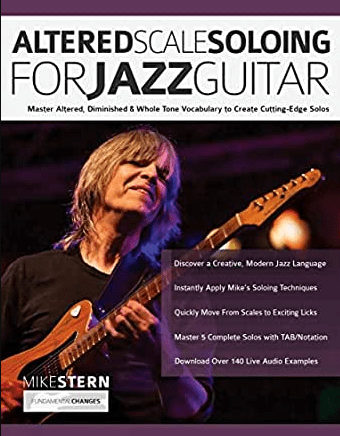
He shares his knowledge and secrets on altered scales to help you develop your unique creative jazz solos. In addition, the book also provides helpful tips on how to practice and apply the concepts learned. Whether you’re a beginner or a seasoned pro, this book is sure to help you unlock your creative potential and take your playing to new heights.
If you’re looking to add some new sounds to your jazz guitar soloing, altered scales are a great place to start. In this book, you’ll learn all about the different altered scales and how to use them in your playing.
You’ll also find a ton of useful exercises to help you apply the concepts you learn. Whether you’re a seasoned jazz player or just getting started, this book is a great way to expand your musical vocabulary and take your playing to the next level.
Minor Pentatonic Soloing Connections
The minor pentatonic scale is one of the most important scales for guitarists to learn, as it is used extensively in rock, pop, and blues music. However, many guitarists get stuck in a rut, playing the same few box shapes and licks over and over again.
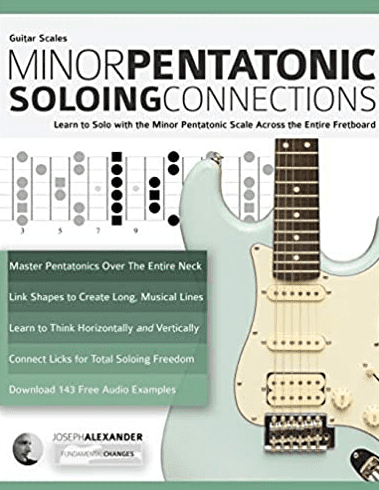
This book seeks to break guitarists out of that pentatonic prison by providing unlimited soloing options and fresh ideas. It does this by showing various licks in all five shapes of the minor pentatonic scale, thus allowing guitarists to think outside of those few box shapes. By providing such a wealth of information, this book will surely help guitarists expand their soloing repertoire and take their playing to the next level.
The Minor Pentatonic Soloing Connections is a great training book for guitarists who want to build up their soloing skills using the Minor Pentatonic scale.
The book features useful scale exercises, licks, patterns, diagrams, and backing tracks to make the learning experience fun and engaging. The exercises in the book will help you to think not only horizontally but also vertically up and down the neck, which will open up a lot of room for fluidity and creativity in your soloing.
All in all, it’s an incredibly helpful book for anyone who wants to improve their Minor Pentatonic soloing skills.
Guitar Scales Handbook
If you’re looking to learn guitar scales, the Guitar Scales Handbook is an excellent resource. What sets it apart from other instructional books is the addition of video lessons.

These videos are incredibly helpful for visual learners or beginners who want to see the concepts in action. Not only are the lessons clear and easy to understand, but they’re also enjoyable to watch. As a result, the Guitar Scales Handbook is an ideal way for anyone to learn about guitar scales.
While it is appropriate for beginners, those with no prior knowledge of music theory might still find it helpful to have a basic understanding of the concepts before diving in.
The book does a great job of breaking down complex topics into manageable chunks, and the accompanying audio tracks are extremely helpful in providing aural reinforcement of the material. If you are serious about becoming a well-rounded guitar player, the Guitar Scales Handbook is an invaluable resource.
What are guitar scales and why do they matter?
A guitar scale is a specific series of notes that are played in ascending or descending order. Most scales follow a specific pattern of intervals, or the space between each note. The most common type of scale is the major scale, which consists of seven notes.

Each note in a major scale is separated by a whole step, with the exception of the interval between the third and fourth notes, which is a half step. The major scale forms the basis for much of Western music, and it is used in a variety of genres including pop, rock, and jazz.
While there are many different types of scales, they all serve the same purpose: to provide a framework for improvising and composing melodic lines. Scales also help guitarists to understand the relationship between different chords and progressions. By learning various scales, guitarists can develop a greater understanding of music theory and improve their improvisational skills.
The different types of guitar scales
There are a variety of different guitar scales that can be used to create different sounds and effects. The most common scale is the major scale, which consists of seven notes. The minor scale is another popular choice, and it consists of six notes.
There are also a variety of other scales that can be used, such as the blues scale, the pentatonic scale, and the chromatic scale. Each of these scales has its own unique sound, and they can all be used to create different types of music.
As a result, it is important for any guitarist to be familiar with the different types of guitar scales. By understanding the different sounds that each scale creates, a guitarist will be able to create the desired effect in their music.
How to practice guitar scales effectively
When it comes to guitar scales, there’s no one-size-fits-all approach. The best way to practice scales depends on your goals, level of skill, and available time.
However, there are some general tips that can help you get the most out of your practice sessions.
First, it’s important to start slow and gradually increase the speed as you become more comfortable with the scale.
Second, focus on evenness and accuracy rather than speed. Third, make sure you’re using a metronome to keep a steady tempo.
Finally, vary your practice routine by trying different fingerings, strumming patterns, and tempos. By following these tips, you’ll be well on your way to becoming a Scale Master in no time!
Tips for using guitar scales in your music playing
As any guitar player knows, scales are a fundamental part of music. They provide a foundation for melody and harmony, and they can be used to create interesting and innovative solos. However, simply playing scales up and down can quickly become monotonous. To truly make use of guitar scales in your playing, you need to be creative. Here are a few tips:
- Use different fingering patterns. This will help to keep your fingers nimble and prevent boredom.
- Experiment with different rhythms. Dotted eighth notes, sixteenth notes, triplets – the possibilities are endless.
- Explore different moods and emotions. Scales can be playful, sad, energetic, or any other feeling you want to express.
- Focus on one particular scale. By really getting to know a single scale inside and out, you’ll be able to use it in more interesting ways.
By following these tips, you’ll be able to make the most of guitar scales in your playing and create music that is truly unique.
Q&A about guitar scales
When it comes to playing the guitar, scales are an essential part of any musician’s toolkit. But what exactly are guitar scales, and how can they be used? Here’s a quick Q&A to help you get started.
What are guitar scales?
Guitar scales are sequences of notes that are played in a particular order. They can be ascending (going up in pitch) or descending (going down in pitch).
What is the purpose of playing scales?
There are many purposes for playing scales on the guitar. They can be used for warm-ups, for developing finger dexterity, for memorizing the fretboard, and for improvising solos.
How do I memorize scales?
There are many different ways to memorize scale patterns. One method is to associate each note with a letter or number (for example, the note C could be associated with the letter A).
Another method is to use visualization, such as tracing the shape of the scale pattern on the fretboard with your finger. Whichever method you choose, make sure to practice regularly so that the scale patterns become second nature.
By understanding and practicing guitar scales, you’ll be well on your way to becoming a better guitarist.
Happy picking!
Summary
Playing guitar scales is an essential part of becoming a better musician. They can be used for warming up, developing finger dexterity, memorizing the fretboard, and improvising solos.
There are many different types of guitar scales, and each one has its own unique sound. The best way to practice scales depends on your goals and level of skill.
However, there are some general tips that can help you get the most out of your practice sessions.
Start slow, focus on accuracy rather than speed, use a metronome, and vary your practice routine. By following these tips and by using some of the guitar scale books suggested above, you’ll be well on your way to becoming a Scale Master in no time!
Best of luck!
